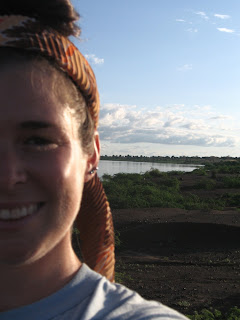


 After waiting with much speculation and excitement, March brought me to my new post and new home for the next two years. As the northern-most volunteer in Niger, I have opened up this region to the Peace Corps program and a region of the country that has been closed since 2001. Kehehe (ke-hay-hay) is a village of about 1500 on the main road to the ancient caravan city, Agadez. It rests in the basin of a watershed and has an enormous lake. Surrounding the lakeside villages, the terrain rises into rolling sand dunes, making it something of an oasis in the desert.
After waiting with much speculation and excitement, March brought me to my new post and new home for the next two years. As the northern-most volunteer in Niger, I have opened up this region to the Peace Corps program and a region of the country that has been closed since 2001. Kehehe (ke-hay-hay) is a village of about 1500 on the main road to the ancient caravan city, Agadez. It rests in the basin of a watershed and has an enormous lake. Surrounding the lakeside villages, the terrain rises into rolling sand dunes, making it something of an oasis in the desert.Kehehe is a comparatively diverse village of Hausa, Tuareg and Fulani ethnic groups. The three groups are marked by very different traditions and occupations. Hausas are found in the eastern half of Niger and share a common language with Nigeria. Families typically have multiple wives with an average of 10 children each, and are sedentary farmers trying to eke a successful harvest from poor soils. Fulanis are found all across the Sahel as they are nomadic herders and frequently hired to take peoples' goats, sheep and camels out to graze. The Tuareg have traditionally inhabited the northern part of Niger and are an ancient culture that spans the Sahara desert of present day Algeria, Libya and Mali. They speak an old and guttural language, Tamachek, and there is an active artisans workshop in my village where they make silver jewelry and swords as well as leather purses, books and boxes.
Large Lake Tabalak grows to be six miles long during the July to September rainy season and offers many work opportunties for the village. Because there is no dearth of water, most people hand dig thousands of acres of gardens in the fertile lake bed as the water recedes. There is also an active fishing industry on the lake that serves up fish in the likes of guppies and catfish which taste great fried up and powdered with red pepper, bones and all!
Proximity to the main road means the villagers are pretty current with news of the outside world, have greater access to business opportunities, and are very accepting of a single white woman living and working with them for two years as part of a project. It also means I get abruptly woken by the "POW" of a flat tire on a passing semi-truck, but I am absolutely thrilled to be living in such a beautiful and interesting place for the next two years and have loved being there so far!
(photo index: Lake Tabalak during rainy season, a Tuareg and his camel winning the race, me in my hut, my women's leader and family in the cold season gardens)


No comments:
Post a Comment